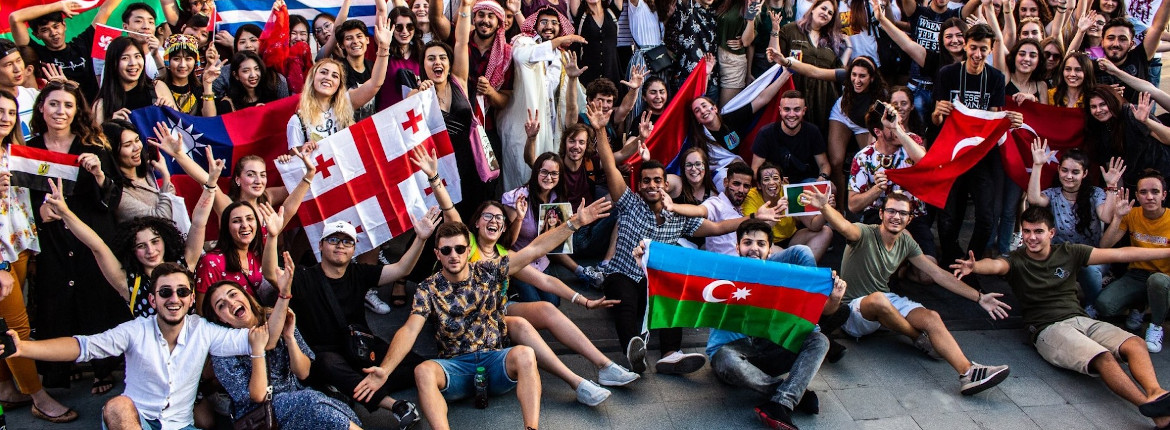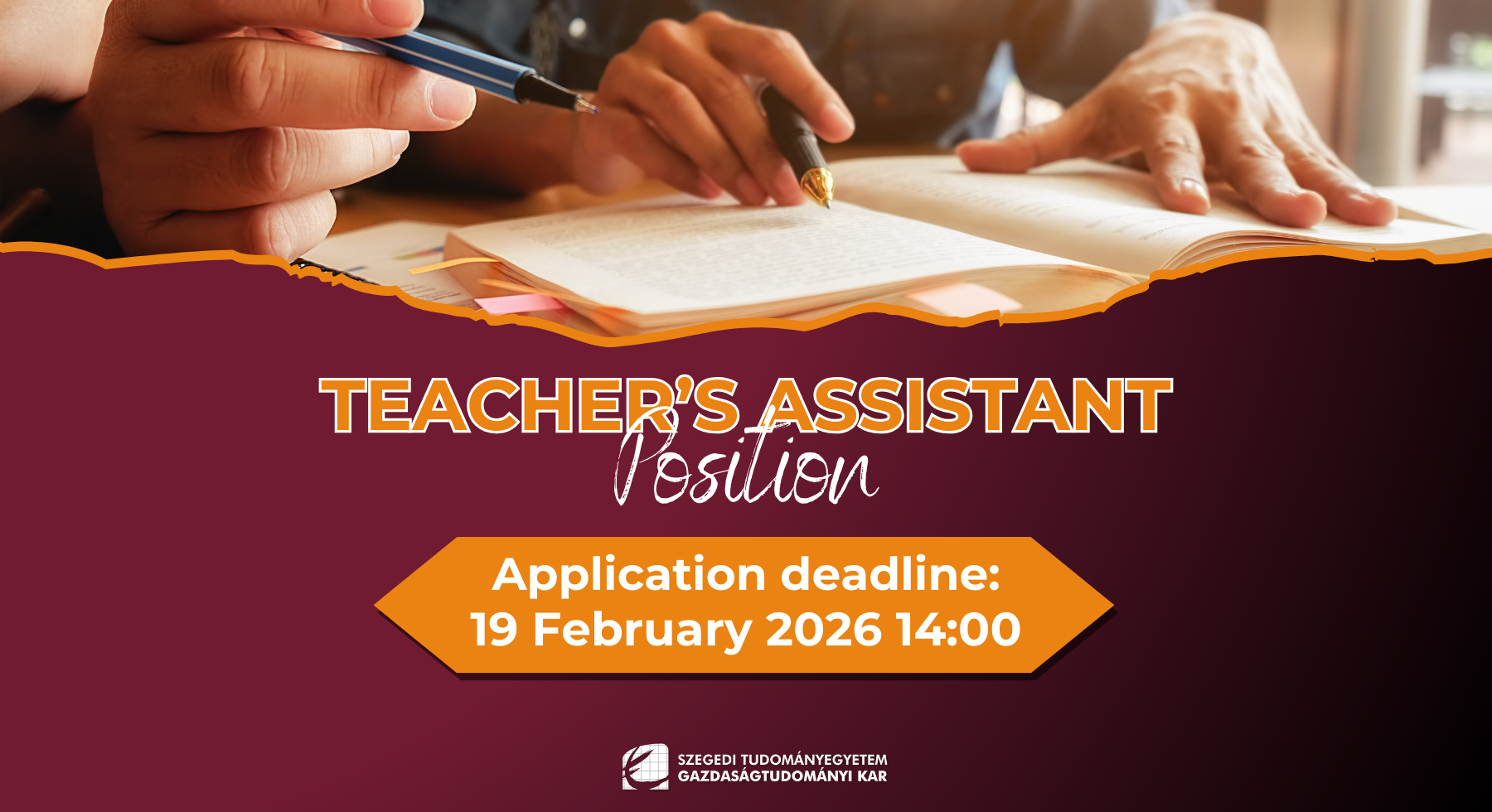
‘Sure! Why not? I don’t have anything to do this summer.’ Erasmus+ voluntary programme experiences
In the summer of 2019 Ahmed Abdullah Sufian Al-Gaberi and Christopher Barasa Aseli, two 3rd year students from the GTK’s ever-growing international community, took part in an Erasmus+ voluntary programme in Craiova, Romania.
For two months, they put their organisational, creative and cooperative skills to the test along with other volunteers from all over the world. Lilla Borbély, also GTK student sat down to talk with Ahmed and Christopher, from Yemen and Kenya respectively, about their summer experiences and memories about voluntary work.
-
How did you find this voluntary work? What was your main motivation for choosing this particular programme?
AHMED: A friend from the master’s programme told me about this opportunity in Romania. He just asked: ‘Hey, do you want to go?’ Me: ‘Sure! Why not? I don’t have anything to do this summer.’ He sent me the link and I applied.
It was an Erasmus+ voluntary programme with the organization Domino Associata (Domino Association).
My main motivation was my love for volunteering, helping other people and raising awareness of important issues. -
Had you ever done voluntary work before this?
A: Yes, I’d had worked with children in Agóra. At first, I thought the language was going to be a barrier, but as it turned out all of the kids’ parents work outside of Hungary, so they spoke fluent English.<
Also, two years ago I worked as a volunteer for Dr. György Málovics, supporting kids from Romani backgrounds. We took them to see a movie and visited the spa of Mórahalom together – we basically arranged fun activities with them.
Now, I am volunteering at Talentum. My latest assignment was to hold a presentation about my country and culture for dumb people with the help of a sign language translator. To be honest, they were more interested and enthusiastic than others: they asked many questions which showed they were really interested in the culture. I am planning to do more.
CHRISTOPHER: I have also worked with Talentum since September 2018 – not with kids, but I visited a high school once where I could give a presentation about the high school in my country. The main point was to show the students that they should love attending school, as they have so many privileges and opportunities. To make them aware of the differences in the Christmas celebrations, for example. We also wanted to get them away from the rushing-from-class-to-class routine for a short while. I’m still working with them, but I haven’t got any projects for this year yet. I hope I’ll get one soon.
-
What were your main tasks? What did you have to do?
C: The main task was to promote the city as a national EU capital. It’s part of a bigger process where the first step is to win at the national level.
A&C: They divided us into ‘departments’ e.g. sports, education, culture department etc.
Each group had to create one event each week. We had to come up with an idea, plan the whole programme, promote it online, make flyers and run it. So, basically, we owned the project. The organisers only made suggestions like ‘Maybe this would be better like this’ and helped us get everything we needed for the programmes. And it felt really good, because at the end of the week you could say ‘Yeah, it was a success and I created it’.
Also, one of the main goals of the whole programme was to create a platform for discussion: How could you improve the city? What are your interests?
A: I was in the Education team, where one of our aims was to reach out to the youth. As a weekly project, we made interviews with the youth of Craiova. One of the goals was to find out their needs, what they wanted in the city. What improvements, other programmes would they be interested in. We went out and asked them in the streets – our target was 500 interviews. To bridge the language barrier, we printed out the questions both in English and Romanian. Thus, if they did not speak English, they could just write down their answers.
C: I was in the Culture team. For instance, once we made a movie event where people could pick and watch a film together (e.g. something connected to history), and afterwards we discussed it.
In another week, we collaborated with a restaurant where besides having a coffee you got the opportunity to learn a new language e.g. level 1 Spanish or the Arabic alphabet. The aim was to create an international environment, to encourage the youth to go out and be open and discover different cultures.
We created Facebook pages, Instagram accounts and multiple flyers during this programme.
Another memorable event was the Bikes event: Romania has one of the largest national parks of Europe, thus we wanted to promote healthy life. The organization booked bikes and we cycled together all around the park.
-
Where did you stay in Romania (which city)?
A: We stayed in Craiova, South of Romania. It’s quite a small city.
C: Way bigger than Szeged, it had a waterpark!
-
How long did you stay there?
A: It was two months, from the beginning of July to the end of August. It seems long, but it was full of fun and just felt too short. ‘Oh, why do we have to pack our bags already?‘
-
Did volunteering have an effect on you?
A: Since I started volunteering, I can get comfortable with new people much more easily. And I’m more open towards them.
C: I developed my time management skills more than ever during these two months. Working with strict deadlines weekly had a great impact on me. We couldn’t miss any dates, there was zero chance for repeating or postponing. Thus, if we couldn’t solve something during the daytime, we stayed up at night.
A: To add some more skills, I personally developed my teamwork, organizing events and communication skills.
C: Also, financial management skills – working from a budget – were important. We got a certain pocket money for food and other stuff that we could use until the end of the month. Thus, we had to be thoughtful and evaluate our expenses. ‘I opened my Excel and looked that yeah I can’t buy it now, I’ll do it next month.’
A: Also, we learned Romanian. We could take an intensive language course there and at the end of the second months we did exams and earned an A2 language certificate.
-
Had you ever been to Romania before volunteering there? Did your impression of the country change after working there?
C: No, it was my first time, but I do listen to a lot of Romanian music and watch football matches. Thus, before the trip, I was excited and I was sure that I was going to have a good time there.
Now, if I think about Romania, I’d say that Romanians are really warm and kind. For instance, when we had to go by train to a place we didn’t know a lady volunteered to get us a taxi just out of kindness.
A: It was my first-time visiting Romania too. I didn’t have any expectations for the country, but rather for the programme itself, e.g. teamwork, success, work on a real project. Although if I have to choose between Romania and Hungary, I’d choose Hungary.
-
How were your co-volunteers (age, nationality, attitude)? Did you get along well?
A: All the volunteers were students from 20 different countries – e.g. Georgia, Portugal, Spain, Yemen, Bulgaria, Italy etc.
We got along really well from the very first moment.
Also, two of my teammates had great experiences to add our Education team, which made our work much easier. They delegated the tasks so well that we didn’t have any conflicts within the group.
C: The team was well-balanced. We had really outgoing and introverted members as well.
-
What's the most memorable part of your trip?
A: For me, the most memorable from this experience is the friendships I developed there with the others. We are still in contact (15 out of 20 people) – we call each other and make videos. It’s definitely still a really strong bond.
C: For me, the fact that we did these weekly projects basically alone is already memorable. Mentors were assigned to the teams, but they only advised. We were the ones who came up with the idea, we executed it and the success was also ours. However, my favourite memory is ‘the book marathons’ that we did among us. We went out to buy books and once we read one, we gave it to someone else, who had to return it after three days. It didn’t matter that you had a project in three days, you had to finish it. It was something that really connected us.
-
Have you had any bad experiences during volunteering?
C: Sometimes we didn’t agree on things and it happened that even though we had discussed how a particular thing should be done, some people just did completely the opposite. This caused stress, as we had to keep our deadlines.
-
Would you recommend doing voluntary work as a student? Why?
A: Every student should do voluntary work during university! It’s a great experience: get engaged with people and develop your own personal skills. It’s one of the best things you can do while being at university.
C: Volunteering is a part of your personal growth. You learn so much and do tasks that you’ve never done before. As a student, it’s the best way to get some practice outside of class. Also, it feels like a break, it energizes you and prepares you for the hard work of the next semester.








